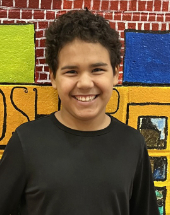MD083206984
| Status: | Available |
| Name: | Prynceton |
| Age: | 13 |
| Race: | Black/African American, Hispanic/Latino |
| Gender: | Male |
| State: | Maryland |
| Case #: |
MD083206984 |
| Last Profile Update: | 07/08/25 |
| Photo Updated: | 07/09/25 |
About Prynceton
Prynceton is a 13-year-old biracial, Hispanic/African American, boy who is into “Minecraft” and “Nintendo Switch”. Prynceton is very active/energetic, and he loves to make things with his hands. He is very inquisitive and will ask questions as he likes to learn new things. Prynceton enjoys attention and can be very friendly and affectionate. He loves snacks but can be a finicky eater.
Prynceton receives services to help him with his emotions. He is engaged and doing very well in treatment, as his behaviors have improved as treatment has progressed. Prynceton has learned to use his coping skills most of the time and has made improvement in self-regulation, and self-reflection, though he still needs prompts and cues. De-escalating situations with Prynceton require skill and patience, thus, emphasizing the need for a caregiver with a specific approach and the therapist is willing to work with the family regarding the approach. Although Prynceton still needs to develop skills and overcome challenges, he has made significant progress.
Prynceton has a history of eating non-edible objects, however, there have been major improvements in this area. His incidents of putting objects in his mouth have decreased as therapy has progressed. Prynceton's tendency to eat non-edible items when upset is an automatic response, and not that his intent is to harm himself. When Prynceton was doing this behavior, he was not aware of the potential consequences as he was unable to use his words to express how he feels. However, since receiving the treatment that he needs, Prynceton has the ability to state his feelings, identify the reasons behind them, and consider better responses.
Prynceton has an IEP and can struggle in the school setting. Therefore, he does his best work when he receives supportive services. Prynceton would do best in a level 5 school with One-to-One services being provided. The One-to-One should be trained to work with a child with Prynceton’s specific needs, considering both Prynceton’s age-appropriate behaviors and his diagnosis. Prynceton’s therapist is willing to work with the One-to-One aide to provide tools and techniques for support. The forever family would need to provide attention to his academic progress and therapeutic resources to support Prynceton’s emotional growth and educational progress.
Prynceton has expressed that he wants a “family”. He needs a “forever” family that is willing to understand him and his needs. For him to thrive, Prynceton needs a structured home environment that is supportive, nurturing but firm. Firm boundaries are needed to prevent regression. The forever family must see him through a “trauma lens” and not be punitive to behaviors nor reactive to behaviors. The forever family can be a one parent or two parent home. If there is not a stay-at-home parent, it is strongly suggested that the parent(s) have a flexible schedule. The forever parent(s) must have patience to help Prynceton process and deal with his emotions. Prynceton can do well with or without other children in the home. Prynceton’s therapist is open to home visits to observe and assist with providing the family with guidance of the structure needed. Prynceton may initially be very guarded but will thrive with the right family.
Lastly, Prynceton has a special bond with one of his previous caregivers and they have regular contact in-person and via telephone. He wants a forever family that is willing to be supportive of this on-going relationship. Prynceton needs a family that will love him “forever”. If that family is yours, please reach out!
